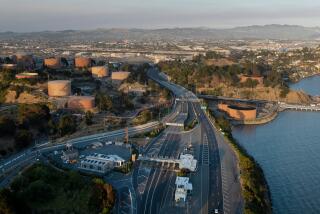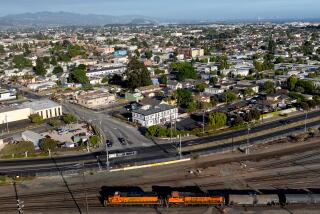Familiar Trade Fears, but Bigger Risks
- Share via
Chevron Corp. Vice Chairman Peter Robertson has a message for rival CNOOC Ltd. -- don’t take it personally.
For the last month, Robertson has been the public face of Chevron as the San Ramon oil giant tries to undercut CNOOC’s chances in what has become a caustic and politically charged battle for Unocal Corp. and its worldwide energy assets. His task is a delicate one: Sink the Chinese oil company’s buyout offer without damaging relations with CNOOC, a partner and customer on some Chevron projects.
“It’s hard, but at the end of the day, hopefully, we’re all practical people,” Robertson said in an interview last week. “The biggest U.S. companies, the biggest international companies -- we compete with them every day, and yet we’re partners with them in many projects around the world. That’s the way we would like to view this too.”
Robertson has been featured in public forums bluntly criticizing CNOOC’s attempt to break up Unocal’s pending sale to Chevron in a cash-and-stock deal valued at $16.9 billion when it was proposed in April. That agreement, worth $16.4 billion on Friday, will be put to a shareholder vote Aug. 10.
The showdown began in late June when CNOOC, a majority of whose stock is held by government-owned China National Offshore Oil Corp., moved to lure away Unocal with an unsolicited $18.5-billion all-cash offer. CNOOC covets the El Segundo company’s hefty oil and national gas reserves in Asia but would also get the company’s holdings in the U.S., including in the Gulf of Mexico.
In response, Chevron put forth Robertson as its antagonist in chief and unleashed its formidable lobbying forces in Washington to spread the notion that CNOOC’s government ties made the Unocal deal a matter of national and economic security.
A Scot by birth and a refinery engineer by training, Robertson is a company man whose 30 years in Chevron management culminated in December in his appointment to the newly created office of the chairman.
In that role, he works closely with David O’Reilly, Chevron’s chairman and chief executive. The two, born only days apart in January 1947, have adjacent offices and meet often to discuss and coordinate their activities, Robertson said.
Observers think Robertson was tapped as chief CNOOC opponent for another reason: to help distance O’Reilly from what was bound to become a heated battle between the bidders.
“He is the hatchet man. He’s playing a useful role as far as putting the company’s view forward,” said Fadel Gheit, an analyst at Oppenheimer & Co. “You want to get someone else so that the CEO can later say, ‘That was not me, that was my deputy.’ ”
Despite the showdown over Unocal, Chevron hopes to avoid discord between the two companies in China, where they are partners in offshore oil development projects in Bohai Bay and the South China Sea. Chevron, a presence in China since 1913, also has gasoline stations and an interest in several methane gas projects in the country.
In Australia, Chevron is one of six companies partnered with CNOOC in a huge operation known as the North West Shelf Venture, which will supply China with liquefied natural gas.
More crucial, however, is Chevron’s 50% stake in the Gorgon liquefied natural gas project off the coast of Australia. In late 2003, CNOOC signed a tentative agreement worth more than $22 billion to take an ownership interest in the project and sizable gas deliveries for 25 years.
Some reports have suggested that negotiations related to that contract have slowed or stalled amid the rancor over Unocal. Both Chevron and CNOOC have disputed that.
In Washington, the CNOOC offer has sparked anti-Chinese rhetoric beyond the proposal to include disputes over trade, currency and foreign policy.
There have been a flurry of letters to President Bush expressing concern over CNOOC’s bid, as well as strident speeches on the House floor, a bipartisan resolution condemning the deal and a hearing before the House Armed Services Committee.
CNOOC has fought back with its own team of lobbyists and a series of ads in publications that cater to Congress urging them to “learn the facts about CNOOC’s bid to buy Unocal.” Those facts, CNOOC said, are that the deal would pose no threat to U.S. national security, that Unocal’s domestic production would stay in the U.S. and that CNOOC would protect Unocal jobs.
Through it all, Robertson’s criticism has been pointed. In interviews, he has labeled CNOOC’s bid as politically sensitive and risky for shareholders, and has complained that the Beijing company’s offer is being unfairly subsidized through low-interest loans from the Chinese government.
The day after CNOOC’s Unocal bid was announced, Robertson went further.
“Americans are worried about the supply of oil and gas. There is an issue here of who can put more oil and gas into the market on a commercial basis,” Robertson told CNBC. “I think if the Chinese government buys this asset, you can be sure that much of these materials will go to China.”
Last week, Robertson struck a more conciliatory tone.
“CNOOC is a very Westernized company, and a good company. I just think that they’re getting a little bit of an unfair advantage here,” he said. As for Fu Chengyu, CNOOC’s U.S.-educated chairman and chief executive, Robertson said, “He’s been to my home. I enjoy him a lot.”
Robertson expressed discomfort with the escalating anti-China rhetoric in Congress, saying that he wanted Chevron’s objections heard, “but we don’t want to participate in all this heat and bad feeling.... That’s not where we are at all.”
CNOOC spokesman Mark Palmer isn’t so sure.
After all, he noted, Chevron’s lobbyists have helped drive congressional opposition from the beginning. Indeed, some of the most vocal congressional critics hail from California, and their speeches and letters to the Bush administration closely track Chevron’s talking points.
In addition, he said, Robertson has “said some unfortunate things about CNOOC.”
Industry experts are divided about the long-term effects of the Unocal fight on Chevron’s relations with CNOOC and its prospects for future business in China.
“Their commentary is that ‘we’re just talking about business.’ ... They think it falls in the category of having a friendly lawsuit going on,” Matthew Simmons, chairman of Houston investment bank Simmons & Co., said of Chevron’s approach. “They’re creating a lot of scar tissue.”
Mikkal Herberg, director of the Asian Energy Security program at the National Bureau of Asian Research in Seattle, said the Chinese would be unhappy about Chevron’s actions.
Still, “my guess would be that China is pragmatic enough to see that all’s fair in business and war, and they will not take it out on Chevron later,” Herberg said. “But I think it’s going to be a close call.”
More to Read
Inside the business of entertainment
The Wide Shot brings you news, analysis and insights on everything from streaming wars to production — and what it all means for the future.
You may occasionally receive promotional content from the Los Angeles Times.










